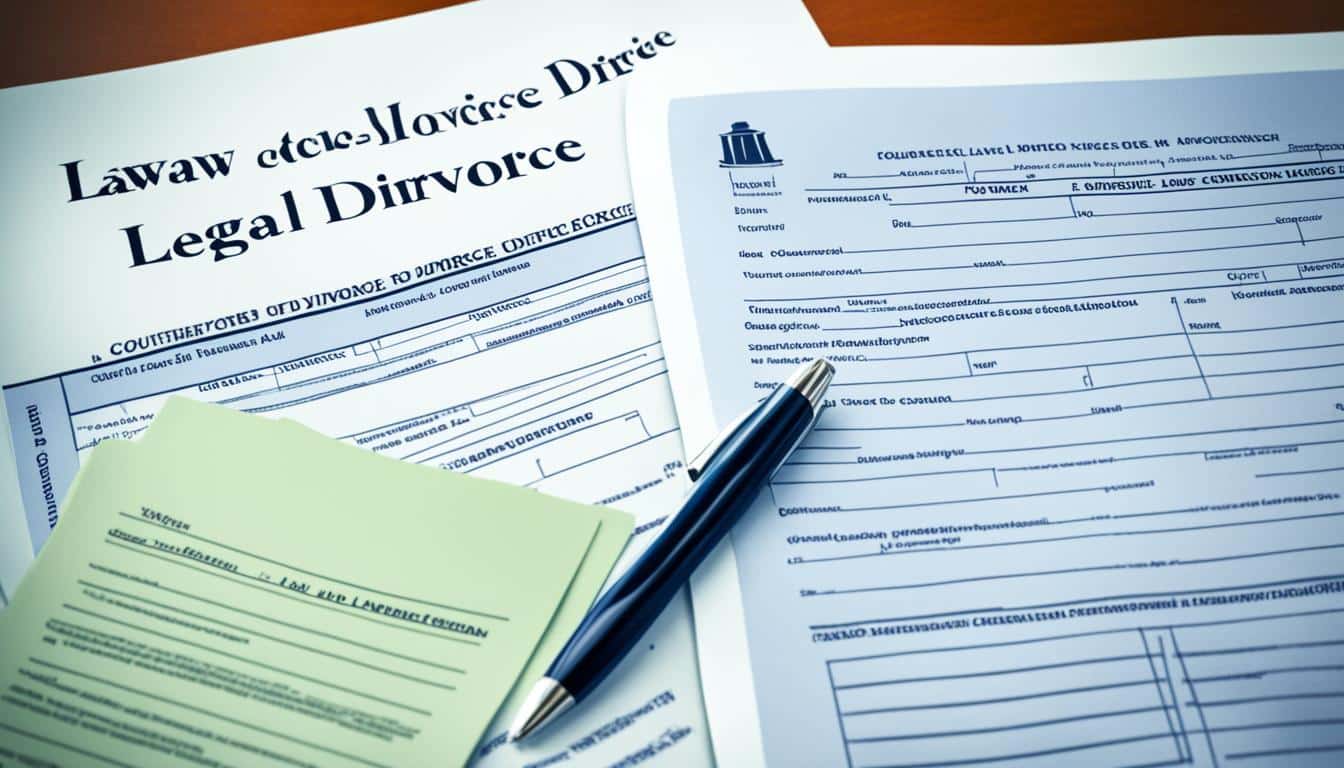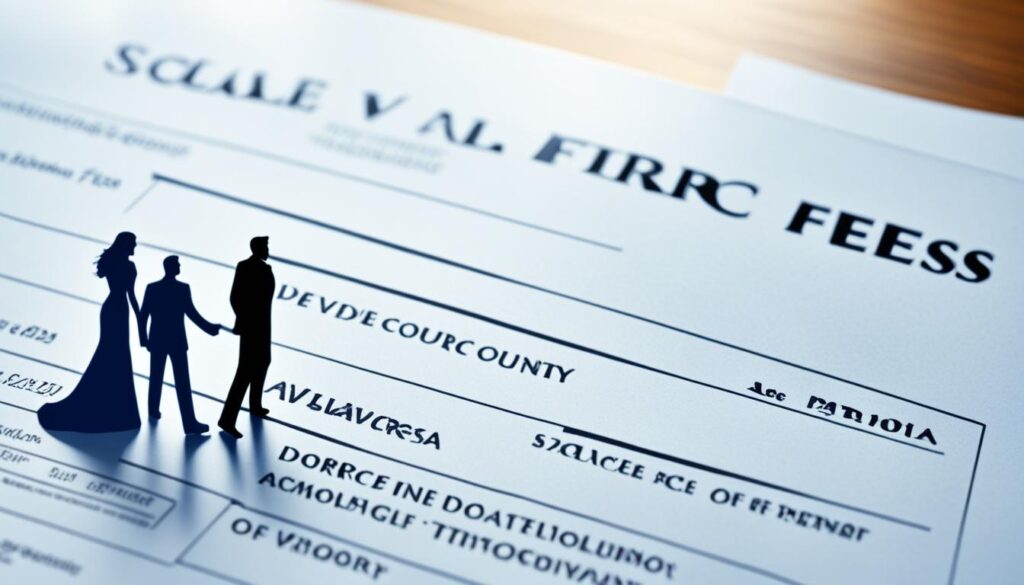Physical Address
304 North Cardinal St.
Dorchester Center, MA 02124
Physical Address
304 North Cardinal St.
Dorchester Center, MA 02124

Filing for divorce in Fairfax County, VA, can feel like navigating through a thick fog. It’s a significant life event, not just a matter of legal paperwork. You’re at a critical juncture, where every decision you make can shape your future. In Fairfax County, the divorce process comes with its unique set of challenges and specific requirements.
To ensure a smoother journey, understanding Fairfax County’s specific divorce laws is crucial. This involves knowing the residency requirements and getting familiar with the intricacies of the local court system. We’re here to guide you through this process, offering clear, actionable advice tailored to Fairfax County. Consider this your guide, designed to simplify a journey that might initially seem daunting.

Are you ready to take the first step towards a new chapter in Fairfax County? Keep reading as we break down the essential steps, aiming to make your path forward clearer and more manageable. Let’s embark on this journey together, moving towards new beginnings and the promise of a fresh start.
To get more info on filing for divorce in Virginia, find a detailed overview in our article, How to File for Divorce in Virginia.
Before filing for divorce in Fairfax County VA, it’s important to understand the residency requirements. At least one spouse must have been a resident of Virginia for a minimum of six months prior to filing. If you and your spouse live in different counties, you can choose to file in either county. Non-residents can also file for divorce in Fairfax County VA if their spouse is a resident of the county.
Being eligible to file for divorce in Fairfax County VA requires meeting the residency requirements set by the state of Virginia. By understanding these requirements, you can ensure that you meet the necessary criteria and proceed with your divorce with confidence.
Filing for divorce as a non-resident of Fairfax County VA is permissible if your spouse is a resident of the county. This allows for flexibility for individuals who may be residing in another county or state. However, it’s essential to seek legal advice to understand the specific requirements and implications of filing as a non-resident.
Residency requirements for divorce in Virginia aim to establish a connection between the jurisdiction and the divorce case. By demonstrating residency, the court ensures that it has the authority to handle the divorce proceedings. This helps in ensuring that divorces are processed following the appropriate legal procedures in the correct jurisdiction.
In Virginia, divorce can be sought on both fault-based and no-fault grounds. Understanding the different grounds for divorce is essential when filing for divorce in Virginia. This section will provide a detailed explanation of fault-based and no-fault grounds for divorce, including the requirements and evidence needed for each.
One of the fault-based grounds for divorce in Virginia is adultery. If a spouse can prove that the other spouse engaged in voluntary sexual intercourse with someone who is not their spouse, it can be considered as a ground for divorce.
Cruelty and bodily harm is another fault-based ground for divorce in Virginia. If a spouse can prove that they have been subjected to cruelty, including physical or mental abuse, they may be eligible for a divorce on these grounds.
Desertion, where one spouse leaves the other without justification and with the intention of ending the marriage, is also recognized as a fault-based ground for divorce in Virginia.
A felony conviction is another fault-based ground for divorce. If one spouse has been convicted of a felony and sentenced to confinement in a penal institution, it can serve as a basis for divorce in Virginia.
Additionally, Virginia allows for no-fault divorce based on living separate and apart without cohabitation for a certain period of time. The specific requirements for a no-fault divorce vary depending on the circumstances. This section will explain the no-fault divorce requirements in Virginia in detail.
Understanding both fault-based and no-fault grounds for divorce is crucial when considering filing for divorce in Virginia. By familiarizing yourself with these grounds, you can make an informed decision that aligns with your specific situation.
Filing for divorce in Fairfax County VA can be a complex process, but with the right guidance, it can be done smoothly. This step-by-step guide will walk you through the necessary steps to file for divorce in Fairfax County VA and provide useful information along the way.
Gathering the Required Information:
The first step in filing for divorce is to gather all the necessary information. This includes personal details, financial information, and any relevant documents such as marriage certificates or prenuptial agreements.
Completing the Divorce Forms:
Once you have gathered all the required information, you will need to complete the divorce forms. These forms include the Complaint for Divorce, which outlines the grounds for divorce, and other supporting documents such as the Child Custody and Visitation Agreement or the Property Settlement Agreement.
Serving the Divorce Papers:
After completing the divorce forms, you will need to serve the papers to your spouse. This can be done through personal service by a sheriff or a private process server. Alternatively, your spouse can accept service voluntarily by signing an acknowledgment of service form.
Navigating the Divorce Process:
Once the divorce papers have been served, the divorce process will begin. This can involve negotiations over child custody, visitation rights, spousal support, and division of assets. It is important to consult with a divorce attorney for assistance in navigating these complex legal matters and protecting your rights.
Divorce Timeline in Virginia:
The timeline for reaching a final divorce decree can vary depending on the specific circumstances of your case. Generally, it takes a minimum of six months from the filing of the divorce complaint to the finalizing of the divorce. However, factors such as the complexity of the case and the court’s schedule can affect the timeline.
Divorce Attorney Assistance in Fairfax VA:
Dealing with a divorce can be emotionally challenging and legally complex. Having the guidance of a divorce attorney in Fairfax VA can help navigate the process, protect your rights, and ensure a fair outcome. An experienced divorce attorney can provide expert advice, negotiate on your behalf, and represent you in court if necessary.
| Step | Description |
|---|---|
| 1 | Gather the required information |
| 2 | Complete the divorce forms |
| 3 | Serve the divorce papers |
| 4 | Navigate the divorce process |
| 5 | Understand the divorce timeline |
| 6 | Get assistance from a divorce attorney |
Following this step-by-step guide will help you file for divorce in Fairfax County VA and ensure that you have the necessary support throughout the process.
Filing for divorce in Fairfax County VA requires payment of court fees. It’s important to understand the filing fees associated with the divorce process to effectively budget for the cost of filing. This section provides detailed information on the filing fees for divorce in Fairfax County VA, including the cost and accepted methods of payment.
When filing for divorce, you will need to pay the court fees, which cover the processing and administration of your case. The fees may vary depending on the specific circumstances of your divorce, such as whether it is contested or uncontested.
Here are some key points to understand about divorce filing fees in Fairfax County VA:
| ServiceCode ReferencesCostDivorce-$86.00Divorce/Resume Maiden Name§§ 17.1-275 A(2), 17.1-279, 58.1-817 (Includes Recording Fees)$108.00 |
|---|
It’s important to note that these fees are specific to Fairfax County VA. If you are filing for divorce in a different county in Virginia, the filing fees may vary. Be sure to check the fee schedule for the specific county where you will be filing.
Understanding the filing fees for divorce in Fairfax County VA will help you prepare financially for the divorce process. By having a clear understanding of the costs involved, you can better plan and navigate the financial aspect of your divorce.

If you are unable to afford the filing fees for divorce in Fairfax County VA, you may be eligible for a fee waiver. This section will provide information on how to obtain a fee waiver, the eligibility criteria, and the documentation required to prove financial hardship. It will also provide resources and options for individuals who may not qualify for a fee waiver but still need assistance with the filing fees.
The court is located at:
4110 Chain Bridge Rd, Fairfax, VA 22030, United States
If you are filing for divorce in Fairfax County VA, it is essential to have the correct address and contact information for the Fairfax County Circuit Court. Navigating the court system can be confusing, but having accurate information will help ensure that your divorce proceedings proceed smoothly.
If you’re unsure about the location or have any questions, you can refer to the official website of the Fairfax County Circuit Court or contact their office directly for assistance.

If you prefer to handle your divorce without an attorney, filing pro se is a viable option. This means representing yourself in the divorce proceedings. While it may seem daunting, with the right guidance and resources, you can successfully navigate the process. Here’s a step-by-step guide on how to file for divorce in Fairfax County VA without an attorney.
The first step is to gather the necessary documents and information required for the divorce. This includes completing the appropriate divorce forms, such as the Petition for Divorce, Financial Affidavit, and Child Custody and Support forms if applicable. Take the time to carefully fill out these forms, ensuring accuracy and completeness. Once completed, you will need to submit the documents to the Fairfax County Circuit Court. It’s important to follow the court’s guidelines for document submission, including providing the required number of copies.
Understanding the court system and its procedures is crucial when filing without an attorney. Familiarize yourself with the specific rules and requirements of the Fairfax County Circuit Court. This includes knowing how to schedule court dates, properly serve the divorce papers to your spouse, and follow any additional procedural steps. It’s helpful to attend any court orientation programs or workshops provided by the court, as they can provide valuable information and guidance.
Fortunately, there are numerous self-help resources available to assist individuals filing for divorce without an attorney. The Fairfax County Circuit Court offers a self-help center where you can find relevant forms, instructions, and resources. Additionally, there are online resources, legal aid organizations, and support groups that can provide guidance and answer your questions throughout the process. Take advantage of these resources to ensure you have the necessary information and support as you navigate the divorce process.
While filing for divorce without an attorney has its advantages, it’s important to consider the disadvantages as well. Divorce is a complex legal process, and without legal representation, you may be at a disadvantage in negotiations or court proceedings. If your divorce involves complex financial matters, child custody disputes, or other legal complexities, it may be necessary to consult with an attorney to protect your rights and interests.
Remember, filing for divorce without an attorney is a personal decision. Ensure you are comfortable with the process and have access to the necessary resources and support. With careful preparation and a clear understanding of the process, you can successfully file for divorce without an attorney in Fairfax County VA.
To see how this process of filing for divorce in Fairfax County compares to that in other VA counties, check out our articles about how to file for divorce in Chesterfield County VA and filing for divorce in Loudoun County VA.